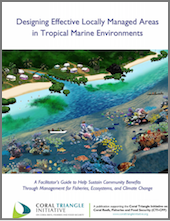Coral Triangle Initiative

The Coral Triangle Initiative on Coral Reefs, Fisheries, and Food Security (CTI-CFF) is a multilateral partnership of six countries working together to sustain extraordinary marine and coastal resources by addressing crucial issues such as food security, climate change and marine biodiversity.
There is broad scientific consensus that the Coral Trianglerepresents a global epicenter of marine life abundance and diversity. Spanning only 1.6% of the planet’s oceans, the Coral Triangle regionis home to is home to the highest coral diversity in the world with 600 corals or 76% of the world’s known coral species. It contains the highest reef fish diversity on the planet with 2,500 or 37% of the world’s reef fish species concentrated in the area. It also a spawning and nursery ground for six species of threatened marine turtles, endangered fish and cetaceans such as tuna and blue whales.These unparalleled marine and coastal living resources provide significant benefits to the approximately 363 million people who reside in the Coral Triangle, as well as billions more outside the region. As a source of food, income and protection from severe weather events, the ongoing health of these ecosystems is critical.
Recognizing the need to safeguard the region’s marine and coastal resources, Indonesian President Yudhoyono inspired other leaders in the region to launch the Coral Triangle Initiative on Coral Reefs, Fisheries and Food Security (CTI-CFF) in 2007. The CTI-CFF is a multilateral partnership between the governments of Indonesia, Malaysia, Papua New Guinea, Philippines, Solomon Islands and Timor-Leste (the ‘CT6’).
At the Leader’s Summit in 2009, these governments agreed to adopt a 10-year CTI Regional Plan of Action (CTI RPOA) to safeguard the region’s marine and coastal biological resources. The RPOA has five goals: strengthening the management of seascapes, promoting an ecosystem approach to fisheries management, establishing and improving effective management of marine protected areas, improving coastal community resilience to climate change, and protecting threatened species.
Through the CTI-CFF, the Coral Triange countrieshave agreed to support people-centered biodiversity conservation, sustainable development, poverty reduction and equitable benefit sharing. The CTI-CFF seeks to address both poverty reduction through economic development, food security, sustainable livelihoods for coastal communities and biodiversity conservation through the protection of species, habitats and ecosystems.
The Story so Far
Despite their significant value, the coral reef ecosystems of the Coral Triangle are among the most threatened in the world. About 95% are at risk – overfishing has affected almost every reef in the region, destructive fishing practices are common, land-based pollution is significant, and coastal development is a growing threat. The future threats from climate change and ocean acidification will compound these problems. Working collaboratively with development partners, non-government organizations and communities, the CTI has made some important progress towards better management and conservation of these valuable ecosystems and resources.
One of the CTI Goals aims to establish a fully functioning and effectively managed region-wide Coral Triangle Marine Protected Area System (CTMPAS). Under the Marine Protected Areas (MPA) Working Group, substantive progress has been made in furthering common understanding about CTMPAS – how to improve management effectiveness and how to design and establish MPA networks.
The working group has prioritized the joint establishment of overall goals, objectives, principle, and operational design elements for a CTMPAS centered on priority MPA networks, resulting in a CTI Regional Framework for the CTMPAS. At the national level, each CT country has nominated an MPA learning and integration site, and a roadmap to develop a national system for evaluation of MPA management effectiveness has been developed. Much of this work will be supported by an information clearinghouse already in place, the Coral Triangle Atlas.
The impacts of climate change are real threats to the eyes of the CT6, and countries have developed a Region-wide Early Action Plan for Climate Change Adaptation (REAP)as the first deliverable of the CTI-CFF. The Plan requires, amongst others, putting in place effective adaptation measures for coastal communities and investing on the ability to conduct climate change vulnerability assessments and to plan for improving resilience of coastal communities.
The Climate Change Adaptation Working Group has also identified priority sites where adaptation measures should be fostered. Additionally, the CTI has actively conducted international outreach on climate adaptation and mitigation, such as through joint communiqués in the past two UNFCCC Conference of the Parties.
The Coral Triangle governments have also progressed toward the formal establishment of the CTI-CFF as a regional organization. At the CTI-CFF Ministerial Meeting in October 2011, the six countries endorsed a suite of legal documents which will guide the operations of the organization, including putting in place merit based recruitment of staff, coordination procedures, and financial contributions to be borne by each country. This suite of foundational agreements will allow a fully independent Regional Secretariatto coordinate the implementation of the CTI Regional Plan of Action.
Commitments by Ministers will pave the way for the CTI-CFF to become an effective and representative forum into the future, and demonstrates the ongoing high-level political will behind this important initiative. While significant progress has been made towards establishing the CTI-CFF and implementing the CTI Regional Plan of Action,the challenges the region faces are complex and long term. The Coral Triangle countries are committed to continued action, but require support of the international community to achieve sustainable change.
